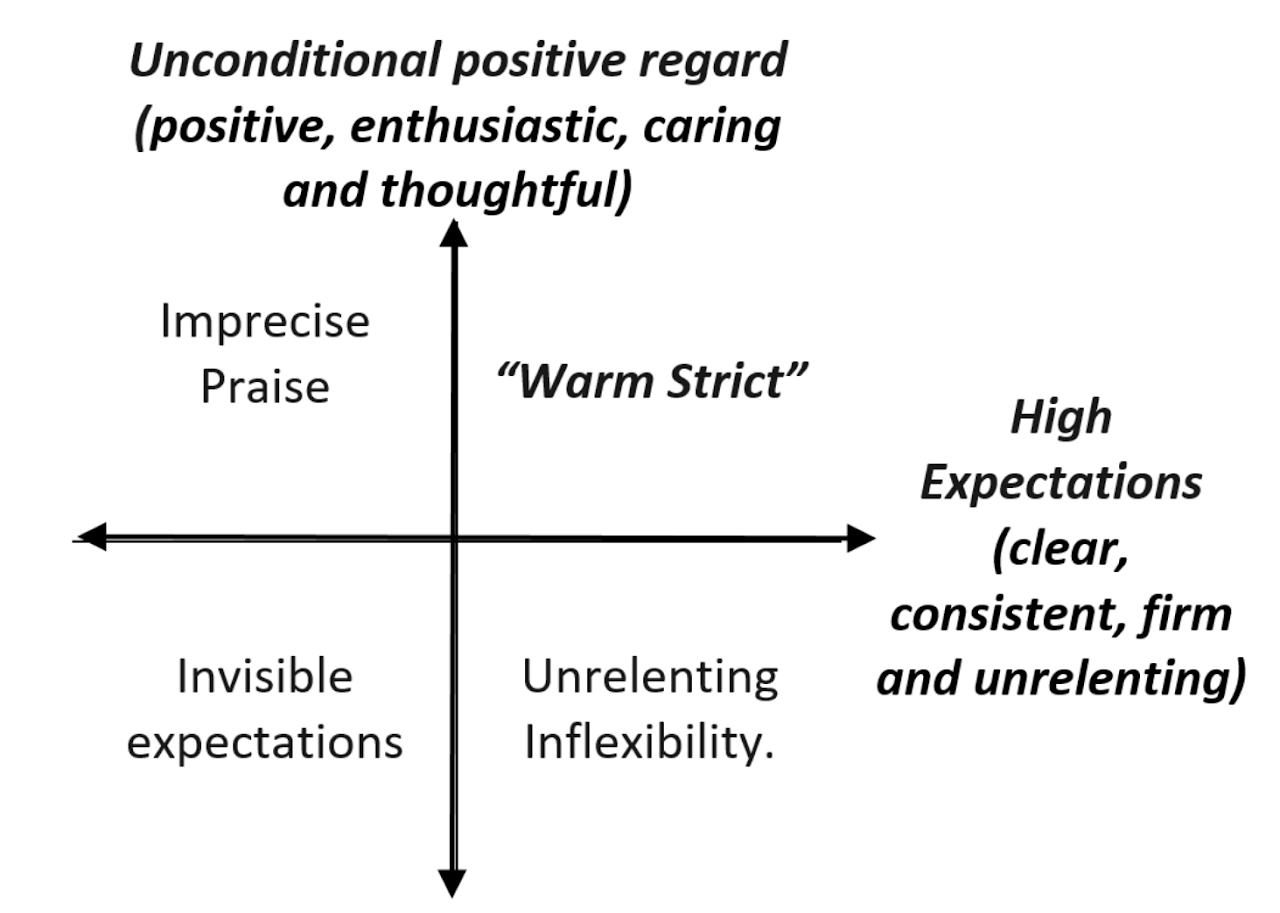Warm/Strict
Warm/Strict: applying Reminder - Warning - BIR
What and why
WhatWarm/Strict:
|
Why
|
When radical candour meets warm/strict

We can draw parallels between Lemov’s Warm Strict and Radical Candour as defined by Kim Scott: in both cases, if the first essential element can be boiled down to sincere human consideration, the second: challenging directly and holding high expectations must represent the feedback offered to make this happen.
Warm Strict is the optimal quadrant, where unconditional positive regard meets high expectations.
Imprecise praise might illustrate a situation in class where praise relates to person/personality and not actions or gives effusive or meaningless affirmations that offer little in the way of deliberate guidance.
- This might lead to a young person feeling inaccurately defined, labelled or constrained.
- This could be intentional, meant as a way to build relationships and trust, or it could be unintentional: as a result of a lack of deliberate planning and thought.
- We might very well care deeply but if the actions we take to demonstrate this are not linked to clear expectations it means that potential learning and relationships are built on shifting sands.
Invisible expectations might see us holding a pupil to account for something that is poorly or barely explained either in terms of behaviour or learning.
- This lack of transparency implicitly relates a lack of connection and creates unnecessary trap doors for pupils, and ultimately, for teachers.
- In the long term this will not only lead to poor relationships but learning is likely to be less effective as low or no expectations conspire with an absence of human consideration.
Unrelenting inflexibility tells a story, rich in expectations and clarity, but locked into the rigid stare of the long and unbending “my way” ahead.
- In this quadrant the paths to learning and behaviours are writ large on a single arrow.
- Learning might be strong but relationships will take time and may not flourish, some resulting barriers may lead to inattentiveness and rejection, leaving room to care more about the people that one might be keen to hold to account in a class.
Warm/strict is a technique geared towards creating an environment where a student understands that you care (warm), but you are in charge (strict).
6 Steps to implement warm/strict1. Front load your expectations I expect you to remain in SLANT… I expect you to track the speaker… 2. Apply antecedents to give students the best possible chance of success Swivel, Proximity, Be seen looking, positive framing etc. 3. When you spot an issue: give a reminder to a student for the expectation they haven’t met Bobby, this is your reminder, I asked all students to remain in SLANT 4. Move on quickly Continue with the phase of the lesson and avoid getting into confrontation with the student 5. Record the reminder or warning on the board so that is is visual This acts as an antecedent for all and ensure your are able to effectively track the R,W, BIR system 6. Consequences are temporary Smile or interact with the student naturally as soon as possible following a R or W. Carry out a restorative conversation following a BIR
|
High Frequency Errors1. Teacher doesn’t front load the expectations Split attention. Low level conversation 2. Doesn’t apply antecedents Sat down at teacher desk. Students don’t feel your presence in the room 3. Doesn’t apply the R,W, BIR system first time, everytime Corrects behaviour without using the system. Doesn’t correct the behaviour 4. Doesn’t move on immediately after the R or W Gets into confrontation with the student. Frames the R or W as a judgement on the person and not the action. 5. Forgets to record the R or W on the board No follow through. Students don’t take it seriously. 6. Consequences are temporary Avoids the student after the R or W. Student thinks its personal. Student doesn’t think you care
|
What A Good One Looks Like
Warm/Strict Criteria
- Consistency in applying sanction eg. 'reminder'
- Say why they received the sanction
- Quickly move on
- Keep learning the focus.
Key takeaways
- Front load expectations and apply antecedents
- Apply R/W/BIR consistently
- Move on quickly
Take the quiz to complete module 3!
Warm/Strict: Applying Reminder - Warning - BIR